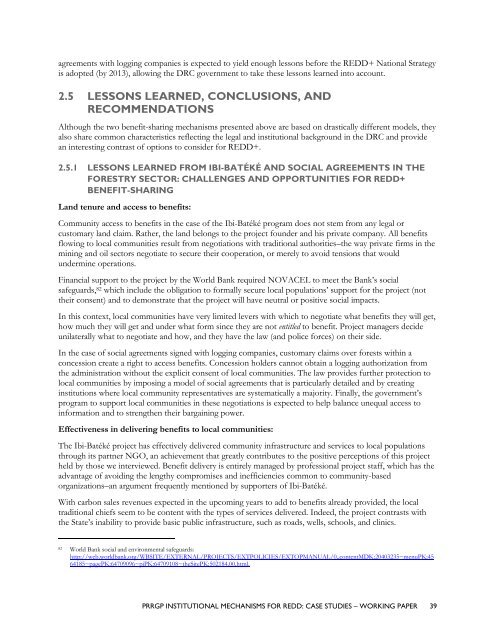Institutional Mechanisms for REDD+ - Case Studies Working Paper
Institutional Mechanisms for REDD+ - Case Studies Working Paper
Institutional Mechanisms for REDD+ - Case Studies Working Paper
Create successful ePaper yourself
Turn your PDF publications into a flip-book with our unique Google optimized e-Paper software.
agreements with logging companies is expected to yield enough lessons be<strong>for</strong>e the <strong>REDD+</strong> National Strategy<br />
is adopted (by 2013), allowing the DRC government to take these lessons learned into account.<br />
2.5 LESSONS LEARNED, CONCLUSIONS, AND<br />
RECOMMENDATIONS<br />
Although the two benefit-sharing mechanisms presented above are based on drastically different models, they<br />
also share common characteristics reflecting the legal and institutional background in the DRC and provide<br />
an interesting contrast of options to consider <strong>for</strong> <strong>REDD+</strong>.<br />
2.5.1 LESSONS LEARNED FROM IBI-BATÉKÉ AND SOCIAL AGREEMENTS IN THE<br />
FORESTRY SECTOR: CHALLENGES AND OPPORTUNITIES FOR <strong>REDD+</strong><br />
BENEFIT-SHARING<br />
Land tenure and access to benefits:<br />
Community access to benefits in the case of the Ibi-Batéké program does not stem from any legal or<br />
customary land claim. Rather, the land belongs to the project founder and his private company. All benefits<br />
flowing to local communities result from negotiations with traditional authorities–the way private firms in the<br />
mining and oil sectors negotiate to secure their cooperation, or merely to avoid tensions that would<br />
undermine operations.<br />
Financial support to the project by the World Bank required NOVACEL to meet the Bank‘s social<br />
safeguards, 82 which include the obligation to <strong>for</strong>mally secure local populations‘ support <strong>for</strong> the project (not<br />
their consent) and to demonstrate that the project will have neutral or positive social impacts.<br />
In this context, local communities have very limited levers with which to negotiate what benefits they will get,<br />
how much they will get and under what <strong>for</strong>m since they are not entitled to benefit. Project managers decide<br />
unilaterally what to negotiate and how, and they have the law (and police <strong>for</strong>ces) on their side.<br />
In the case of social agreements signed with logging companies, customary claims over <strong>for</strong>ests within a<br />
concession create a right to access benefits. Concession holders cannot obtain a logging authorization from<br />
the administration without the explicit consent of local communities. The law provides further protection to<br />
local communities by imposing a model of social agreements that is particularly detailed and by creating<br />
institutions where local community representatives are systematically a majority. Finally, the government‘s<br />
program to support local communities in these negotiations is expected to help balance unequal access to<br />
in<strong>for</strong>mation and to strengthen their bargaining power.<br />
Effectiveness in delivering benefits to local communities:<br />
The Ibi-Batéké project has effectively delivered community infrastructure and services to local populations<br />
through its partner NGO, an achievement that greatly contributes to the positive perceptions of this project<br />
held by those we interviewed. Benefit delivery is entirely managed by professional project staff, which has the<br />
advantage of avoiding the lengthy compromises and inefficiencies common to community-based<br />
organizations–an argument frequently mentioned by supporters of Ibi-Batéké.<br />
With carbon sales revenues expected in the upcoming years to add to benefits already provided, the local<br />
traditional chiefs seem to be content with the types of services delivered. Indeed, the project contrasts with<br />
the State‘s inability to provide basic public infrastructure, such as roads, wells, schools, and clinics.<br />
82 World Bank social and environmental safeguards:<br />
http://web.worldbank.org/WBSITE/EXTERNAL/PROJECTS/EXTPOLICIES/EXTOPMANUAL/0,,contentMDK:20403235~menuPK:45<br />
64185~pagePK:64709096~piPK:64709108~theSitePK:502184,00.html.<br />
PRRGP INSTITUTIONAL MECHANISMS FOR REDD: CASE STUDIES – WORKING PAPER 39

















